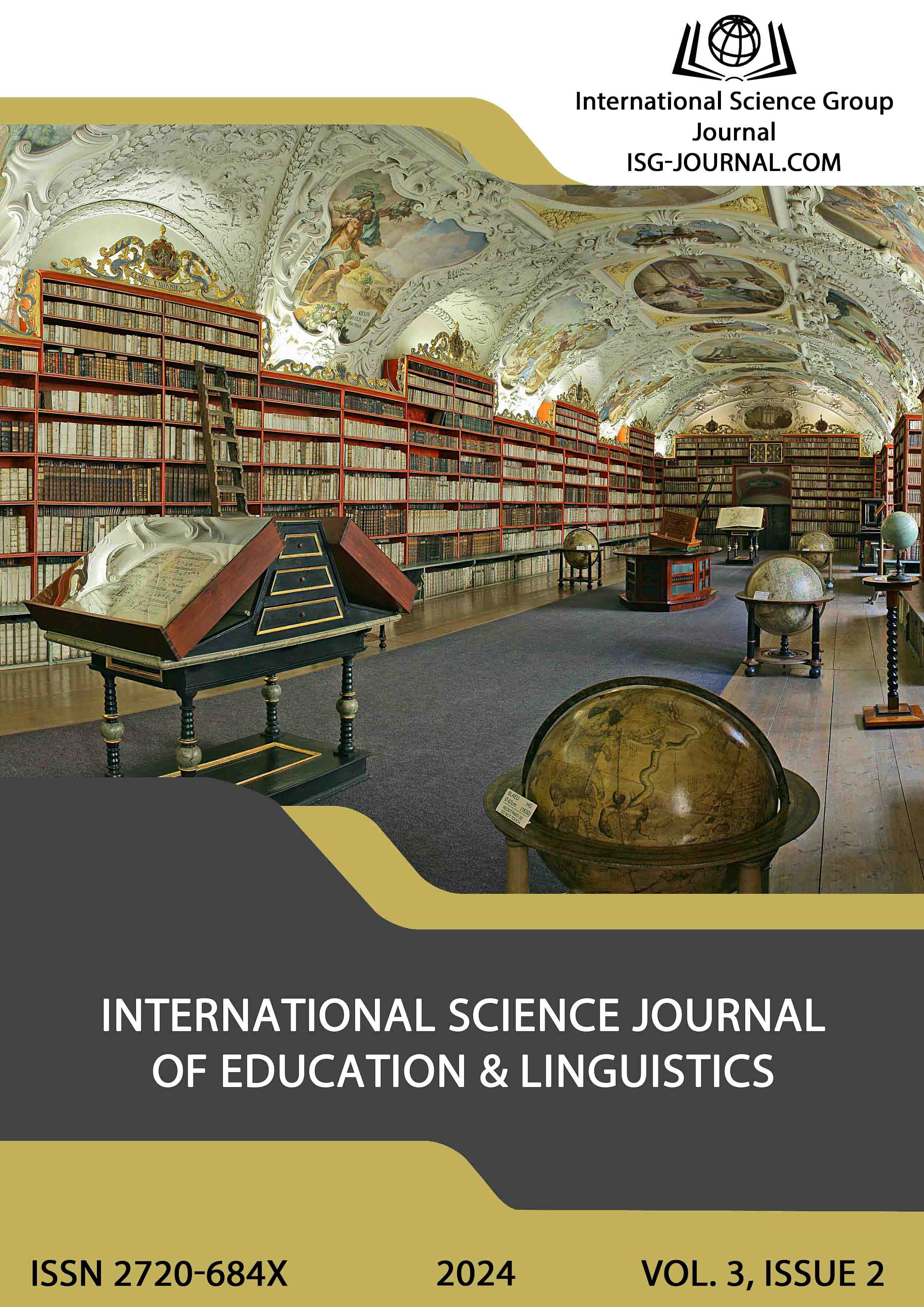Expanding the potential vocabulary of students-philologist: methods of semanticizing the potential lexicon
DOI:
https://doi.org/10.46299/j.isjel.20240302.07Keywords:
potential vocabulary, potential lexica, semanticization of potential vocabulary, students-philologists, extension of potential vocabularyAbstract
The article reveals the ways of semanticizing potential vocabulary to expand the potential lexics of students-philologist. It was determined that the potential vocabulary of students- philologist includes normative, derivative and idiomatic groups of unfamiliar lexical units of English, which can be self-intelligible when formed using familiar grammatical methods or with the help of context, and intuitive feelings. The methods of semanticization of students' potential vocabulary are established, which include: the isolation of cognate words that facilitate the understanding of the text, and the semanticization of the meaning of words according to the nature of lexical units and the features of their derivation (groups of simple, complicated and complex derivation). Extension of the potential vocabulary is carried out on the basis of suffixation, prefixation, parasynthetic formation, conversion, international words, ambiguity, and phraseological units. It was found that the introduction of lexics should be carried out taking into account the semantic connections of words in a syntagm or paradigm to reveal external connections. The internal connections and properties of the word can be revealed using the means of a foreign language (method of semanticization without translation) or native language (translated method of semanticization). The types of exercises based on the semanticization of students’ potential vocabulary are provided (informational, operational and motivational). The stages of potential vocabulary formation are summarized: 1) correlation of unstudied words with mastered basic words; 2) recognition of lexical units based on systematization of their meanings and comparison of grammatical forms; 3) establishing difficulties in understanding potential vocabulary; 4) systematization of potential vocabulary based on logical conclusion, linguistic guess, context of its application. Further research on the problem of extending students’ potential vocabulary can be carried out by intervention of contextual semantics into the system of exercises for the formation of a potential vocabulary.References
Тарнопольский, О.Б. (2006). Методика навчання іншомовної мовленнєвої діяльності у вищому навчальному закладі освіти. Київ: Фірма «Інкос».
Мокреєва, Н.Г. (1970). Навчання розумінню невивчених слів під час читання французькою (у старших класах середньої школи): Дис. ... канд. пед. наук. Київ.
Шапкіна, O. (1980). Розширення потенційного словникового запасу на основі багатозначності для читання текстів французькою мовою: автореф. дис. …канд.пед.наук. Київ.
Швець, Н. (2021). Мовна здогадка як інструмент перекладу англомовних контамінантів. Збірник науковий праць «Нова філологія», № 81, Том ІІ, 193-197.
Gains, R. (1986). Working with words: A guide to teaching and learning vocabulary / R. Gains, St. Redmann. Cambridge: Cambridge University Press.
Morgan, John (1995). Vocabulary / John Morgan, Mario Rinvolucri. Oxford: Oxford University Press.
Richards, J. C., Rodgers, T. S. (2001). Approaches and Methods in Language Teaching. 2nd edition. New York: Cambridge University Press.
Логвіна, С. А. (2010). До проблеми трактування поняття «Іншомовний потенційний словник. Вісник Черкаського університету. Вип.176, 88-92.
Логвіна, С.А. (2010). Практичний курс формування потенційного словника студентів філологічних спеціальностей педагогічних університетів. Одеса.
Логвіна, С.А. (2014). Формування потенційного англомовного словника майбутніх філологів для сприймання автентичного мовлення: дис. …к.п.н. 13.00.02 – теорія та методика навчання (германські мови). Одеса: Південноукраїнський національний педагогічний університет імені К. Д. Ушинського.
Картон, А. С. (1976). Роль здогадки в процесі використання мови та в процесі навчання мови. Методика викладання іноземних мов за кордоном. М: Прогрес, Випуск ІІ.
Кондратьєва, В. А. (1974). Оптимізація засвоєння лексики іноземної мови. Х.: Наша школа.
Берман, І. (1970).Методика навчання англійської мови у немовних вишах. М: Вища школа.
Ковбасюк, Т., Михайлова, І. (1977). Формування потенційного словника. Нариси методики навчання читання іноземними мовами. Київ: Вища школа.
Попова, А.К. (1983). Використання парадигматичних та синтагматичних зав’язків слів у практиці викладання англійської мови. Шляхи вдосконалення методичної та мовної підготовки студентів на факультетах іноземних мов та на неспеціальних факультетах. Винниця.
Пасов, Є.І. (1983). Комунікативний метод навчання іншомовному говорінню. М: Просвітництво.
Мартинова, Р.(2004). Цілісна загальнодидактична модель змісту навчання іноземних мов: Монографія. К.: Вища школа.
Базіна, М.П. (1984). Специфіка умовно-мовленнєвих вправ для формування рецептивних лексичних навичок. Іноземні мови у вищій школі / За ред. С. К. Фоломкіної. Вип. 20, К.: Вища школа, 108-115.
Левашов, А.С. (1987). Розвиток здатності студента прогнозувати на мовному рівні як підвищення зрілості читача. Іноземні мови у вищій школі, Вип. 20, 23-29.
Баннікова, Л.С. (2007). Методика викладання іноземних мов та технічні засоби навчання: курс лекцій для студентів 3 курсів спеціальностей "Англійська мова", "Німецька мова". Гомель: Гомельський державний університет ім. Ф. Скорини.
Downloads
Published
How to Cite
Issue
Section
License
Copyright (c) 2024 Valeriia Oleinikova

This work is licensed under a Creative Commons Attribution 4.0 International License.





